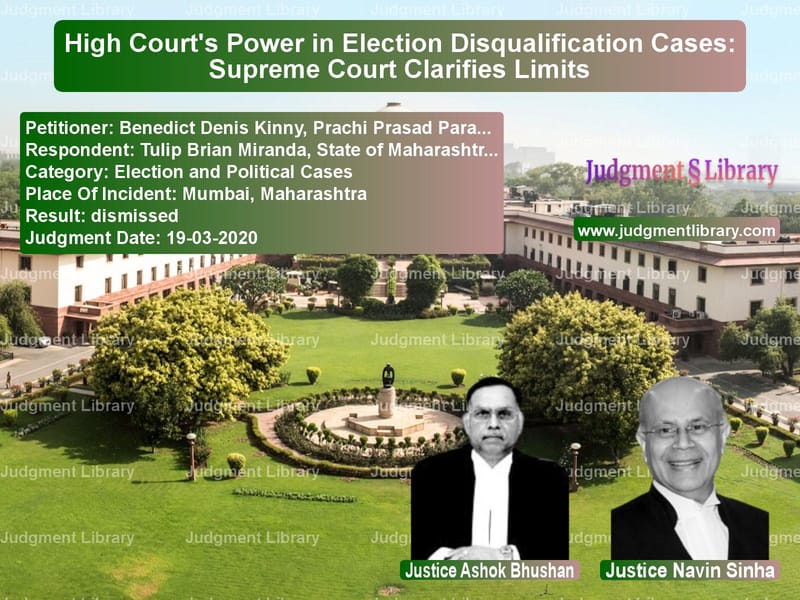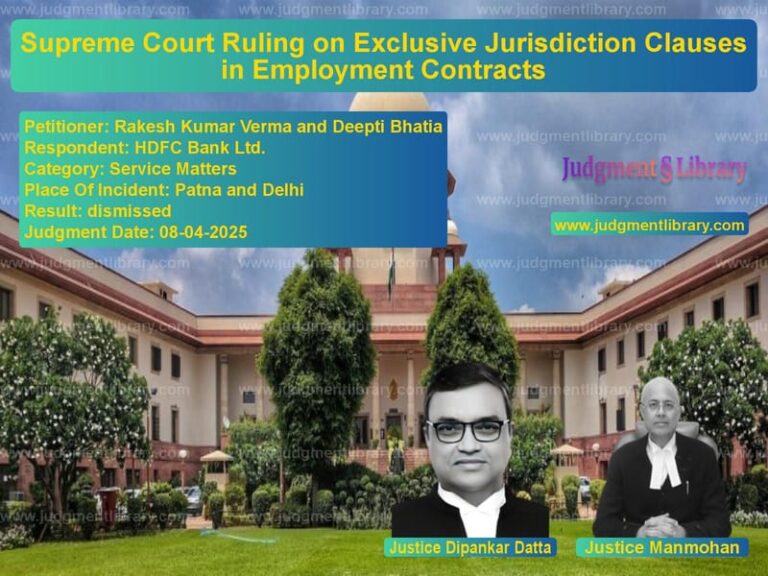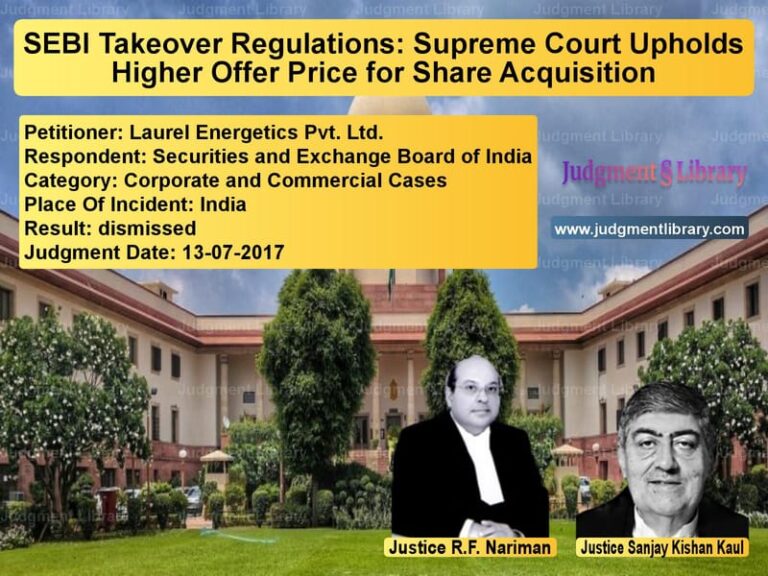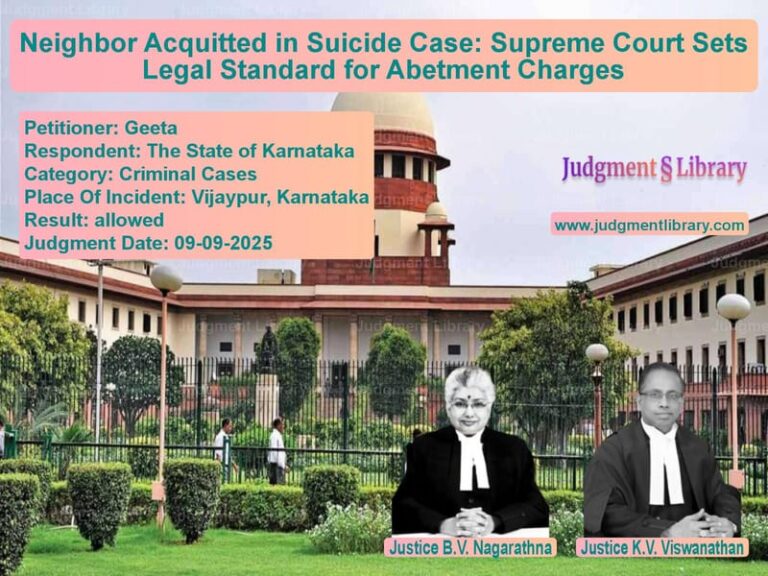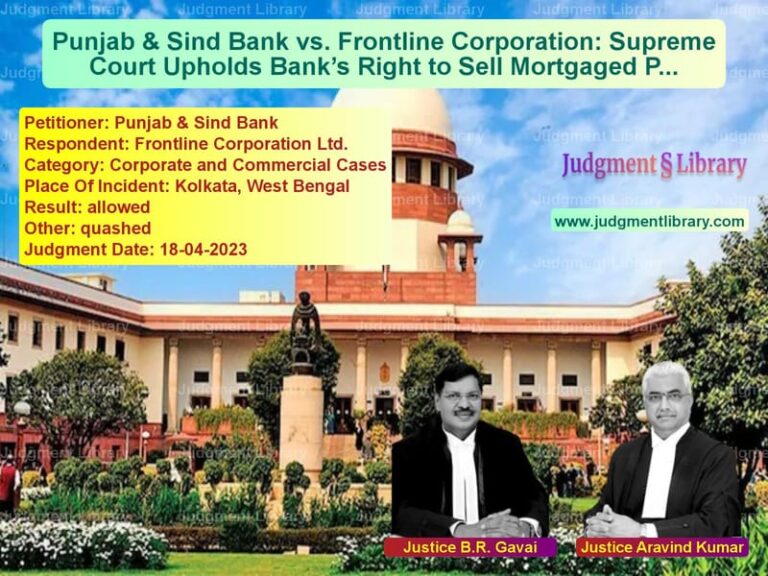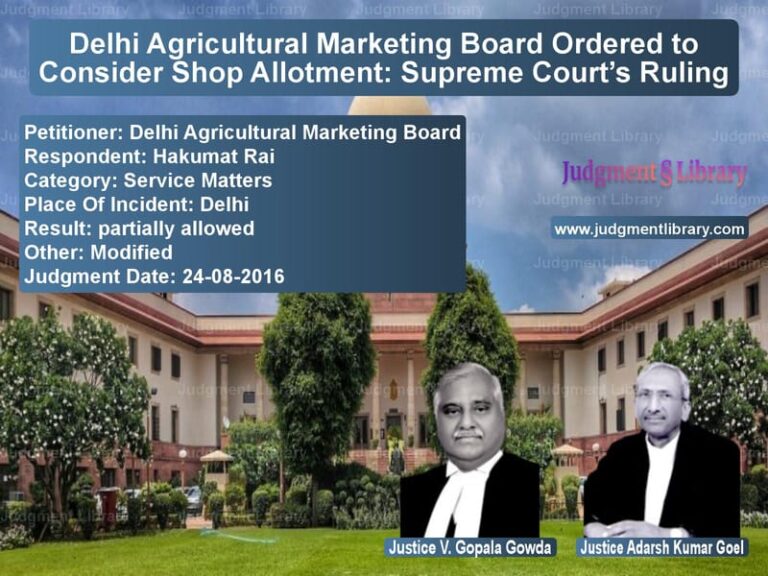High Court’s Power in Election Disqualification Cases: Supreme Court Clarifies Limits
The case of Benedict Denis Kinny v. Tulip Brian Miranda & Ors. and Prachi Prasad Parab v. The State of Maharashtra & Ors. revolves around a crucial constitutional question—whether the High Court, in the exercise of its writ jurisdiction under Article 226 of the Constitution, can interfere with a legal fiction enacted in a state law. These cases specifically address the implications of caste certificate validation requirements under the Mumbai Municipal Corporation Act and their effect on the disqualification of elected municipal councillors.
The Supreme Court was tasked with deciding whether the High Court’s order, which allowed councillors to continue in their elected positions despite not producing the required caste validity certificate within the mandated period, was justified. The ruling ultimately reinforced the High Court’s discretionary power in exceptional cases while affirming the mandatory nature of caste validation laws in municipal elections.
Background of the Case
Both cases involved elected municipal councillors whose caste claims had been invalidated by the Caste Scrutiny Committee. Under Section 5B of the Mumbai Municipal Corporation Act, a candidate contesting a reserved seat must submit a caste validity certificate at the time of nomination. If the certificate is not available at that time, an undertaking must be submitted, committing to producing the certificate within a specified period (originally six months, later extended to twelve months).
If the certificate is not submitted within this timeframe, the election is deemed to be terminated retrospectively, and the candidate is disqualified. However, in these cases, the candidates approached the High Court before the expiry of this period, obtaining interim relief that effectively postponed their disqualification. The Supreme Court was called upon to determine whether such relief could override the statutory consequences of failing to produce the validity certificate within the prescribed time.
Key Legal Issues
- Whether the High Court’s jurisdiction under Article 226 is barred due to the statutory scheme of Section 5B of the Mumbai Municipal Corporation Act.
- Whether the High Court had the authority to pass an interim order effectively suspending the operation of the legal fiction of retrospective termination.
- Whether the High Court’s final judgment, which allowed the councillors to continue in their seats, was legally tenable.
- Whether judicial review can override a mandatory statutory provision governing election disqualification.
Arguments by the Petitioners
The petitioners, challenging the High Court’s decision, argued that:
- Section 5B is mandatory, and its provisions must be strictly enforced.
- The High Court lacked jurisdiction to extend the statutory period for submitting the caste validity certificate.
- Judicial intervention should not obstruct the functioning of an electoral statute that mandates automatic termination upon non-compliance.
- The High Court’s interference disrupted the electoral process and created uncertainty in reserved category elections.
Arguments by the Respondents
The respondents, defending the High Court’s decision, countered that:
- The right to seek judicial review is a fundamental right and cannot be taken away by a statutory provision.
- The interim relief granted by the High Court was necessary to prevent injustice, as their caste claims were rejected improperly.
- Since the High Court ultimately quashed the Scrutiny Committee’s decision and remanded the matter for reconsideration, the councillors were entitled to continue in their seats.
- Courts must balance electoral integrity with fairness, ensuring that candidates are not disqualified based on erroneous administrative decisions.
Supreme Court’s Observations
The Supreme Court examined the scope of Article 226 and the High Court’s power to grant interim relief in election matters. The Court made the following key observations:
- The power of judicial review under Article 226 is a fundamental feature of the Constitution and cannot be ousted by statutory provisions.
- The High Court has the authority to pass interim orders in exceptional cases, particularly where a statutory decision is under judicial scrutiny.
- While Section 5B creates a mandatory requirement, its application must be consistent with the principles of fairness and constitutional safeguards.
- Interim relief should not be granted routinely but may be warranted in cases where procedural lapses or administrative errors unfairly impact a candidate.
Final Judgment
The Supreme Court upheld the High Court’s judgment, allowing the councillors to continue in office pending the final decision of the Caste Scrutiny Committee. The key aspects of the ruling were:
- Section 5B is mandatory but does not preclude judicial review.
- The High Court has the discretion to grant interim relief in cases where statutory compliance is challenged on legitimate grounds.
- The courts must balance statutory mandates with constitutional principles of justice and due process.
- While election laws must be strictly followed, they should not be applied mechanically in cases where genuine grievances exist.
Conclusion
This judgment sets a crucial precedent in election law, affirming that statutory provisions governing candidate disqualification must be interpreted in light of constitutional principles. Key takeaways include:
- The High Court’s power of judicial review remains intact, even in matters of electoral disqualification.
- Statutory legal fictions, such as retrospective termination of election, must be examined in light of fairness and justice.
- Caste validity requirements must be strictly followed, but candidates must have a reasonable opportunity to contest erroneous administrative decisions.
- Judicial intervention in election matters must be exercised cautiously, ensuring that it does not disrupt democratic processes while safeguarding individual rights.
The ruling provides clarity on the interplay between statutory mandates and constitutional protections, ensuring that electoral laws serve both administrative efficiency and substantive justice.
Petitioner Name: Benedict Denis Kinny, Prachi Prasad Parab.Respondent Name: Tulip Brian Miranda, State of Maharashtra.Judgment By: Justice Ashok Bhushan, Justice Navin Sinha.Place Of Incident: Mumbai, Maharashtra.Judgment Date: 19-03-2020.
Don’t miss out on the full details! Download the complete judgment in PDF format below and gain valuable insights instantly!
Download Judgment: Benedict Denis Kinny vs Tulip Brian Miranda, Supreme Court of India Judgment Dated 19-03-2020.pdf
Direct Downlaod Judgment: Direct downlaod this Judgment
See all petitions in Fundamental Rights
See all petitions in Public Interest Litigation
See all petitions in Legislative Powers
See all petitions in Judgment by Ashok Bhushan
See all petitions in Judgment by Navin Sinha
See all petitions in dismissed
See all petitions in supreme court of India judgments March 2020
See all petitions in 2020 judgments
See all posts in Election and Political Cases Category
See all allowed petitions in Election and Political Cases Category
See all Dismissed petitions in Election and Political Cases Category
See all partially allowed petitions in Election and Political Cases Category

